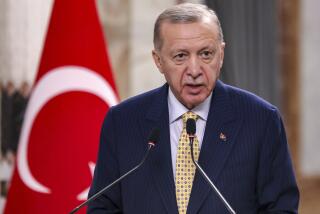West Should Welcome Turkey
- Share via
ISTANBUL — For most Americans, the most important day this month is Dec. 25. For Turks, it’s tomorrow, Dec. 17. That’s the day that the European Union will announce whether it will open full membership negotiations with Turkey.
In contrast to the ambivalence that surrounds the EU in most of its member states, Turks seem to be, almost without exception, enthusiastic about falling under the sway of a Brussels bureaucracy. EU membership is widely expected to deliver an economic windfall in the form of greater trade and subsidies.
More broadly, joining the EU would fulfill the vision of Kemal Ataturk, the army general who created the modern Turkish republic out of the ruins of the Ottoman Empire in 1923. Ataturk, who is almost a deity in modern Turkey (his portrait adorns not only every government office but also almost every shop and home), wanted to modernize his country. Thus he substituted European hats and suits for fezzes and robes, and he adopted the Latin alphabet in place of Arabic letters. Having Turkey officially join Europe, notwithstanding the fact that 95% of its territory is located in Asia, would be the ultimate affirmation of Kemalism.
The irony is that this is happening under a government whose outlook is sharply at odds with Ataturk’s. The ruling Justice and Development Party, led by Prime Minister Recep Tayyip Erdogan, is an Islamic organization that opposes Ataturk’s secular policies. It would, for instance, like to end the ban on women wearing head scarves in government buildings. In the past the military, which sees itself as the guarantor of Ataturk’s legacy, would not have hesitated to step in and topple a government that got out of line. Today there’s much less chance of that happening because Turkey must adhere to democratic norms to enter the EU.
Traditionally the United States has been a close ally of Turkey and a strong supporter of its membership in the EU. But as Turkey gets closer to that goal, a funny thing is happening: Its relationship with Washington has been getting more and more strained. Having spent the last week speaking to audiences across Turkey in a lecture tour sponsored by the U.S. State Department, I’ve discovered that Turks are becoming positively Parisian in their disdain for the United States. Most Turks were violently opposed to the U.S. invasion of Iraq, which they feared would lead to a separate Kurdish state, and nothing that’s happened since has led them to change their minds.
Last month’s assault on Fallouja induced paroxysms of rage here. Newspapers were full of imaginative claims about Americans using chemical, biological, even nuclear weapons. A leading Turkish member of Parliament accused the Marines of committing “a genocide [that] was never seen in the time of the pharaohs, nor of Hitler.” Far from trying to extinguish such inflammatory rhetoric, Erdogan added fuel to the fire by referring to the “hundreds of martyrs” killed in Iraq. The prime minister has also called into question the Turkey-Israel alliance by strongly condemning Israeli actions against terrorism -- none of which exceed the harsh steps taken by the Turkish security services to put down a revolt by Kurdish separatists in the 1970s and 1980s.
The shift in tone on the part of the Turkish government can be attributed partly to the fact that Erdogan represents Sunni Muslims, who are sympathetic to their coreligionists fighting Israeli and American “imperialism.” Washington is not blameless either; the Bush administration has not done a very good job of managing this international alliance, or most others. But there is also widespread suspicion that Turkey feels compelled to adjust its traditionally pro-American attitudes in order to curry favor with anti-American EU members like France and Germany.
This might lead some Americans to wonder whether Turkish membership in the EU is such a good idea after all. It shouldn’t. Notwithstanding numerous transatlantic squabbles, the EU is a positive force for integrating southern and eastern European countries firmly into the fold of the West, institutionalizing democracy and opening up their closed economies. EU membership may be a bad deal for Britain, whose free market is hampered by heavy-handed regulation from Brussels, but it would be a positive force for change in Turkey, which still has a long way to go before it can enjoy British-style prosperity or stability.
What Americans should hope is that the EU will not make the process of integrating Turkey too long and drawn out. While Turkey remains outside the EU, its face pressed to the glass, it will feel compelled to kowtow to the mandarins of Brussels, Paris and Berlin. If it ever gets inside the door, it can afford to follow its own political path, as Poland, Britain, Italy and other EU members already do.
More to Read
Sign up for Essential California
The most important California stories and recommendations in your inbox every morning.
You may occasionally receive promotional content from the Los Angeles Times.













